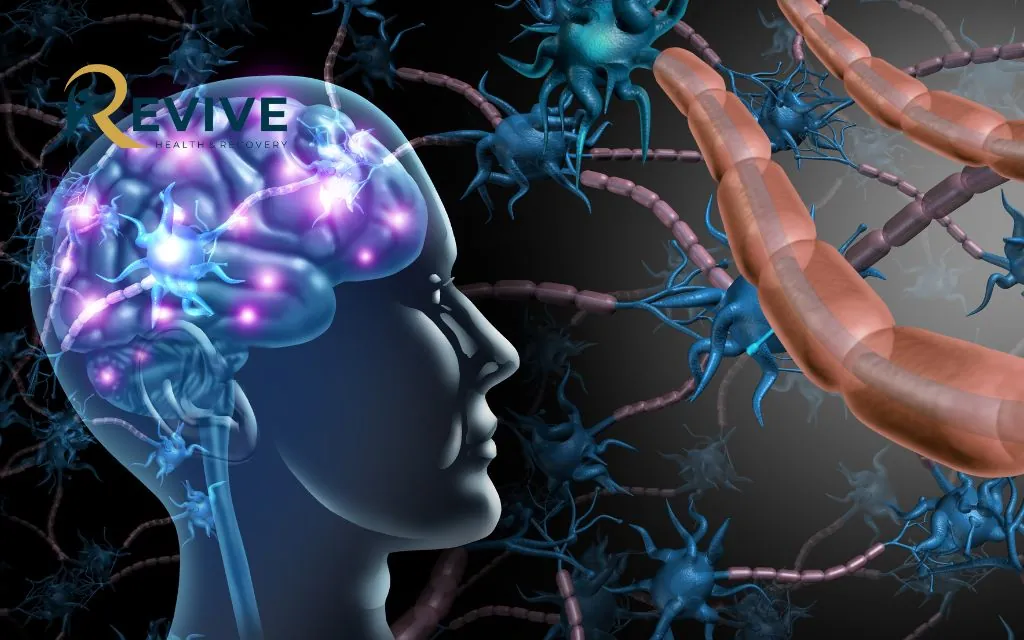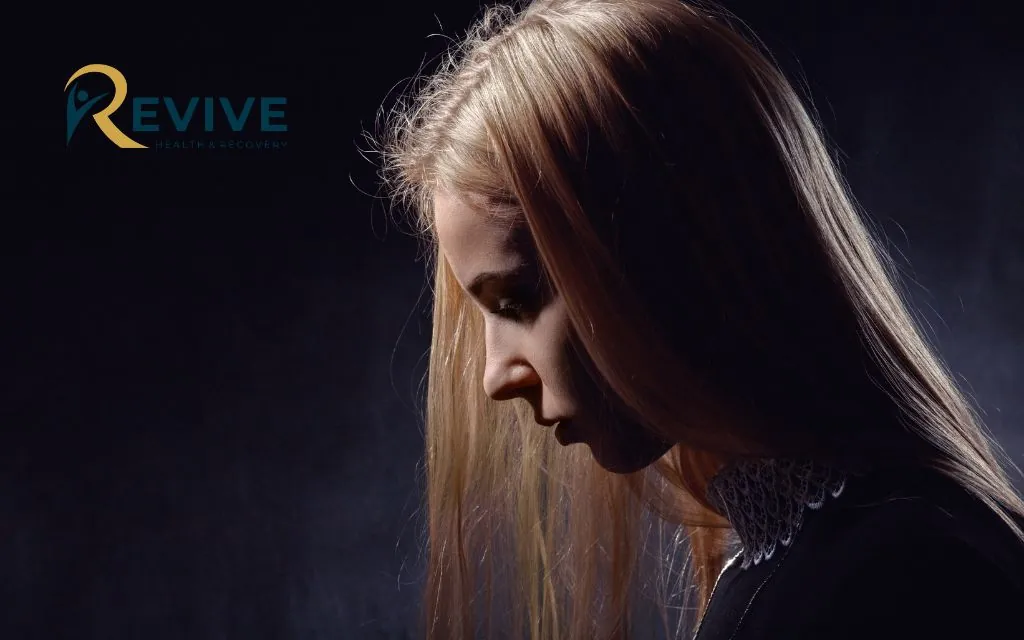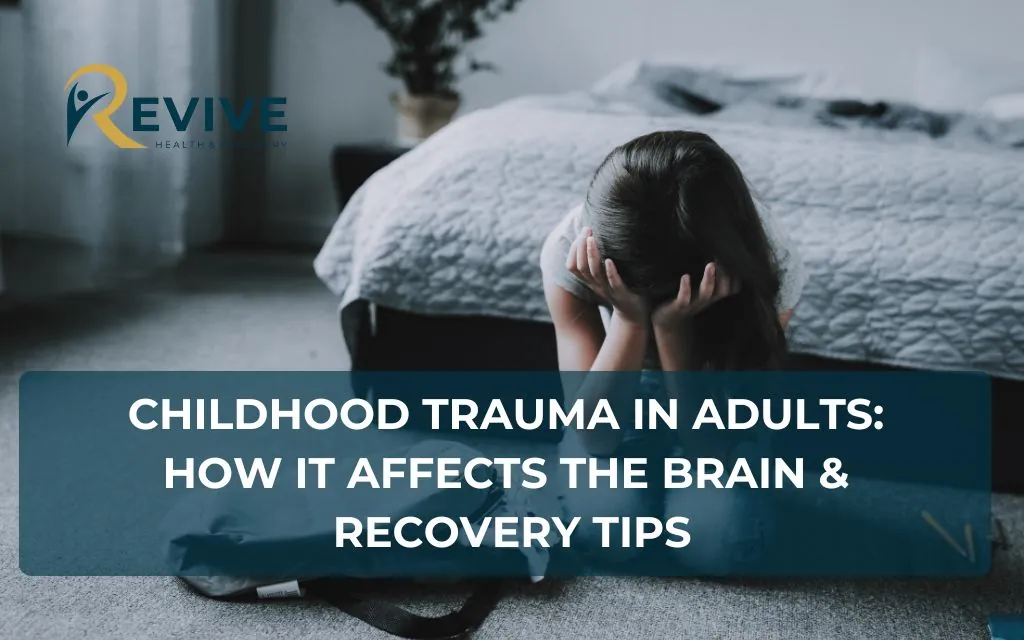Childhood trauma in adults encompasses adverse experiences that occur during development, leaving lasting impacts on mental health, relationships, and physical wellness into adulthood. These experiences range from abuse and neglect to household dysfunction, creating neural pathways that can persist throughout life.
At Revive Health Recovery, we recognize your journey. Your survival through these experiences demonstrates remarkable resilience, even as the aftereffects continue to influence your daily life. Our goal is to help Denver residents understand how past trauma shapes present challenges and connect you with effective healing pathways in our community.
The path forward involves understanding your experiences, recognizing their impact, and accessing specialized trauma-informed care. Denver offers numerous resources for healing, including evidence-based therapies and supportive communities ready to assist your recovery journey.
What is Childhood Trauma and Why It Still Affects Adults
Definition & Common Types
Childhood trauma refers to overwhelming adverse experiences occurring before age 18. For a comprehensive overview of how these experiences contribute to conditions like PTSD, visit the Mayo Clinic’s guide on trauma and its effects.
Common forms include:
- Physical abuse or violence
- Sexual abuse
- Emotional abuse and psychological maltreatment
- Neglect (physical or emotional)
- Witnessing domestic violence
- Parental substance abuse
- Family member incarceration
- Parental mental illness
- Parental separation or divorce
- Community violence
These experiences fundamentally disrupt a child’s sense of safety, security, and trust during critical developmental periods.

The Science Behind Trauma’s Lingering Effects
Childhood trauma creates lasting neurobiological changes. When young brains experience chronic stress, the fight-flight-freeze response becomes overactive, leading to persistent hypervigilance and reactivity. The brain prioritizes survival over higher functions like reasoning and emotional regulation.
Research in neuroscience demonstrates that trauma alters brain structures, including the amygdala (fear center), hippocampus (memory processing), and prefrontal cortex (executive function). The National Institute of Mental Health provides detailed insights into how these changes link to stress-related disorders.
These changes explain How Childhood Trauma Affects Health Across A Lifetime in adults. It manifests through emotional dysregulation, intrusive memories, and difficulty with trust and decision-making decades later.
Significantly, trauma becomes stored in implicit memory systems, creating reactions to present situations based on past dangers. This explains why many adults with childhood trauma experience disproportionate emotional responses without understanding their origin—their nervous systems respond to unconscious trauma triggers.
Explore this further at Verywell Mind’s article on trauma effects.
ACE Scores and Adult Outcomes
The landmark Adverse Childhood Experiences (ACE) study established clear links between childhood trauma and adult health outcomes. Each additional ACE increases risk for:
- Depression (4.5x higher with ACE score ≥4)
- Anxiety disorders (2.5-3x higher risk)
- Substance use disorders (4-7x increased risk)
- Chronic physical conditions (heart disease, autoimmune disorders)
- Suicide attempts (12x higher with ACE score ≥4)
This research validates that childhood experiences create biological changes affecting lifelong health, not just psychological impacts. Understanding this connection helps remove self-blame and opens pathways to healing through attachment theory and trauma recovery approaches.
Colorado-Based Studies
A 2019 survey by the Colorado Department of Public Health found that 15.8% of Denver adults reported four or more ACEs, slightly higher than the national average. Colorado health researchers have linked these higher ACE scores to increased rates of substance use and mental health challenges in the Front Range area.
The Colorado Health Institute reports that Denver County residents with high ACE scores utilize mental health services at lower rates than needed, highlighting a treatment gap that organizations like Revive Health Recovery work to address through specialized trauma therapy.

How Childhood Trauma Shows Up in Adults
Emotional and Behavioral Symptoms
Unresolved childhood trauma often manifests through:
- Persistent anxiety, worry, and hypervigilance
- Depression and feelings of emptiness
- Emotional numbness or disconnection
- Difficulty identifying or expressing feelings
- Panic attacks triggered by trauma reminders
- Flashbacks or intrusive memories
- Dissociation (feeling detached from yourself)
- Sleep disturbances and nightmares
- Chronic fatigue and concentration problems
- Heightened startle response
- Shame and self-criticism
These symptoms represent adaptive responses that once helped manage overwhelming experiences but now limit wellbeing and functioning.
Learn more about these trauma responses at Psychology Today’s trauma basics.
Relationship and Attachment Challenges
Childhood trauma fundamentally affects how we connect with others:
- Trust issues and fear of abandonment
- Difficulty with healthy boundaries
- Anxious attachment (fear of rejection, excessive need for reassurance)
- Avoidant attachment (emotional distancing, independence)
- Disorganized attachment (unpredictable responses to intimacy)
- People-pleasing behaviors
- Trauma bonding (attachment to harmful relationships)
- Difficulty communicating needs
- Conflict avoidance or reactivity
- Patterns of unhealthy relationships
These patterns stem from early attachment disruptions, creating relationship templates that persist until addressed through therapy and mindfulness work.
Self-Destructive Patterns
Many adults with childhood trauma develop coping mechanisms that provide temporary relief but create additional problems:
- Substance use disorders
- Self-harm behaviors
- Eating disorders
- Compulsive behaviors (spending, gambling, working)
- Risk-taking behaviors
- Self-sabotage of success or happiness
- Perfectionism and unrealistic standards
- Chronic procrastination
- Isolation from support systems
These patterns represent attempts to manage overwhelming emotions or achieve control. Through therapeutic interventions, healthier coping strategies can replace these survival mechanisms.

Therapies That Help Heal Childhood Trauma
EMDR Therapy
Eye Movement Desensitization and Reprocessing (EMDR) therapy helps process traumatic memories through bilateral stimulation. During EMDR sessions, you recall difficult memories while following the therapist’s finger movements, taps, or sounds, engaging both brain hemispheres.
This process allows traumatic memories to transform from their “stuck” emotional state into processed memories, reducing their emotional charge. EMDR helps the brain file these experiences as past events rather than current threats.
Revive Health Recovery offers EMDR therapy with certified practitioners who specialize in childhood trauma treatment. Many Denver clients report significant symptom reduction within 8-12 sessions, though individual results vary based on trauma complexity.
Trauma-Focused CBT (TF-CBT)
Trauma-Focused Cognitive Behavioral Therapy combines trauma-sensitive interventions with cognitive restructuring techniques. This approach helps identify and challenge negative beliefs formed during traumatic experiences.
Key components include:
- Psychoeducation about trauma responses
- Relaxation and emotional regulation skills
- Cognitive processing of traumatic events
- Development of a coherent trauma narrative
- In vivo exposure to trauma reminders (when appropriate)
- Enhancing safety and future development
TF-CBT typically involves weekly sessions over 3-6 months, with homework assignments to reinforce skills. This evidence-based approach shows particularly strong results for processing childhood abuse and neglect.
Internal Family Systems (IFS) & Somatic Therapy
Internal Family Systems therapy views the mind as naturally divided into sub-personalities or “parts,” each with unique needs and roles. Through IFS, you identify protective parts that developed during trauma and access your innate self-healing capacity.
Somatic therapy addresses trauma stored in the body through:
- Body awareness exercises
- Physical release techniques
- Movement therapies
- Nervous system regulation
These approaches recognize that trauma lives in both mind and body, requiring integrated healing approaches that Denver practitioners at Revive Health Recovery have specialized training to provide.
Mindfulness and Holistic Approaches
Mindfulness practices complement traditional therapy by cultivating present-moment awareness without judgment. For trauma survivors, mindfulness helps distinguish past from present, creating safety for healing.
Effective mindfulness approaches include:
- Meditation and breathwork
- Body scan practices
- Mindful movement (yoga, tai chi)
- Expressive arts therapies
- Nature-based healing
Denver offers numerous mindfulness resources, including specialized trauma-sensitive yoga classes and mindfulness for childhood trauma recovery groups at community centers throughout the city.
Discover more to have a deep insight of childhood trauma and why healing matters.

Healing Locally in Denver: Find the Right Support
Top Trauma Therapists & Clinics in Denver
Denver provides numerous options for trauma-specialized care:
Revive Health Recovery offers comprehensive trauma treatment programs with therapists specifically trained in childhood trauma recovery. Their integrated approach combines evidence-based therapies with holistic support services, making them a leading provider for adults seeking healing from early traumatic experiences.
Other resources include:
- Denver Mental Health Collective
- Trauma Recovery Center at University of Colorado
- Denver Family Institute
- Colorado Center for Clinical Excellence
Each offers different specializations, so finding the right match for your specific needs improves treatment outcomes.
What to Look for in a Therapist
When seeking therapy for childhood trauma in adults Denver residents should consider these qualifications:
- Specific trauma training and certification
- Experience with your specific trauma type
- EMDR or somatic therapy certification
- Trauma-Focused CBT training
- Knowledge of attachment theory and childhood trauma
- Cultural competence
- Personal comfort and rapport
The therapeutic relationship itself is crucial for healing. Schedule initial consultations with 2-3 providers to find the right match for your healing journey.
Understanding Cost & Insurance in Colorado
Therapy costs in Denver typically range from $100-200 per session, though many providers offer options:
- Most accept major health insurance plans that cover mental health
- Colorado’s parity laws ensure mental health coverage
- Colorado Medicaid covers trauma-focused services
- Community mental health centers offer sliding scale fees
- HSA/FSA accounts can be used for therapy expenses
- Many practices offer payment plans or scholarships
Revive Health Recovery works with most insurance providers and offers financial counseling to determine the most affordable options for your care.
Self-Help Strategies to Begin Healing
Mindfulness-Based Healing
While professional treatment provides essential structure for trauma recovery, daily practices support the healing process:
- Grounding techniques for flashbacks (5-4-3-2-1 sensory method)
- Breathing exercises (4-7-8 breath, box breathing)
- Body scan meditations before sleep
- Journaling prompts for processing emotions
- Free apps like Insight Timer, Calm, or PTSD Coach
These tools help regulate your nervous system and build awareness of trauma responses. Start with just 5 minutes daily to establish consistency.
Building Resilience Over Time
Healing childhood trauma requires rebuilding fundamental self-care foundations:
- Consistent sleep schedule (aim for 7-9 hours)
- Nutritional support (regular meals, hydration)
- Physical movement that feels good (walking, dancing, stretching)
- Time in nature (Denver’s parks and mountain access)
- Structure and routine to create predictability
- Small daily accomplishments to build confidence
These practices counteract the physiological impacts of trauma and support nervous system regulation essential for deeper healing work.
Creating Healthy Relationships After Trauma
As healing progresses, relationship patterns can transform:
- Practice identifying and setting boundaries
- Develop assertive communication skills
- Learn to identify emotional needs
- Build a supportive community
- Practice vulnerability in appropriate contexts
- Recognize relationship patterns before they replay
Support groups specifically focused on attachment theory and childhood trauma can provide practice grounds for these skills in a safe environment.

Real Recovery Stories from Denver
“After decades of anxiety and failed relationships, I finally understood how my childhood was affecting my adult life. Working with trauma specialists at Revive Health Recovery helped me process what happened and build the life I always wanted. For the first time, I feel present instead of just surviving.” – M.K., 42
“I tried regular therapy for years without understanding why I couldn’t move forward. Finding trauma-specific treatment in Denver changed everything. Using EMDR and somatic work, I finally processed memories I’d buried for 30 years. The nightmares have stopped, and I’m learning to trust again.” – J.T., 38
“Growing up with an alcoholic parent left me always waiting for the other shoe to drop. Through therapy, I’ve learned to recognize when I’m reacting to old trauma versus responding to what’s happening now. The difference in my relationships and work life has been profound.” – S.R., 45
Your story can change too. Reach out today.

FAQs about Childhood Trauma in Adults
What are signs of unresolved childhood trauma in adults?
Common signs include relationship difficulties, anxiety, depression, emotional numbness, trust issues, hypervigilance, and self-destructive behaviors. Physical symptoms like chronic pain, digestive issues, and autoimmune disorders can also connect to unresolved trauma. Revive Health Recovery offers comprehensive assessments to identify how childhood experiences affect your current life.
Is childhood trauma treatable even decades later?
Yes, absolutely. The brain remains plastic throughout life, allowing for healing at any age. While early intervention is ideal, many adults find significant relief through specialized trauma therapy even 40-50 years after the original experiences. Revive Health Recovery specializes in treating childhood trauma in adults of all ages with remarkable success rates.
How long does therapy take to work?
Most people notice some improvement within 3-6 months of consistent therapy. Complex trauma may require 1-2 years of treatment for full integration and healing. At Revive Health Recovery, we develop individualized treatment plans that respect your pace and process. Small changes accumulate into significant transformation over time.
What’s the best type of therapy for trauma in Denver?
The most effective approaches include EMDR, Somatic Experiencing, Internal Family Systems, and Trauma-Focused CBT. Revive Health Recovery offers all these evidence-based methods, tailoring treatment to your specific needs rather than applying a one-size-fits-all approach. The best therapy combines effective methods with a strong therapeutic relationship.
Can I heal without professional therapy?
While self-help approaches and support groups provide valuable tools, complex childhood trauma typically requires professional guidance for complete healing. Many people combine professional therapy with self-directed practices for optimal results. Revive Health Recovery offers both individual therapy and skills groups to support your comprehensive healing journey.
Conclusion
Healing from childhood trauma represents one of life’s most profound journeys – moving from survival to genuine living. The impacts of early experiences are real and significant, but they need not define your future. Denver offers robust resources for trauma recovery, and your capacity for healing remains intact regardless of when you begin.
Remember that healing happens in relationships. The isolation that often accompanies trauma can be transformed through connection with skilled providers and supportive communities. You’ve already demonstrated remarkable strength by surviving your experiences and seeking information about healing.
The next step begins with a single action. Contact Revive Health Recovery at (303) 268-4655 for a free consultation to discuss your specific situation and explore treatment options. Our trauma specialists understand the courage this call requires and stand ready to support your journey toward wholeness.



